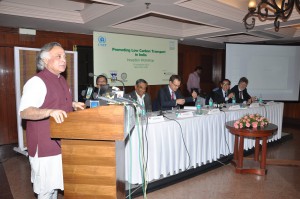Promoting Low Carbon Transport in India
The project has two key interventions:
- To create an enabling environment for coordinating policies at the national level for building a sustainable transport system, and
- To increase the capacity of cities to improve mobility while lowering CO2 emissions.
Mitigative actions at national level are the development of a Transport Action Plan for India ( roadmap) on the contribution of the transport sector to climate change. This includes sustainability indicators, conducting an integrated assessment of the transport sector spanning a period of 2010 till 2050, undertaking a fuel efficiency policy study in support of the development of the National Fuel Efficiency Standards of India, development of case studies to assess the sustainability impacts of transport infrastructures, and developing a framework for climate proofing transport infrastructure. The city level actions are developing a methodology for Low-carbon Comprehensive Mobility Plans (LCMPs), developing LCMPs for 3 cities (Rajkot, Udaipur and Vishakhapatnam), and production of a guidebook on preparing LCMPs for cities. Key project ideas and proposals stemming from the LCMPs work in cities will be further developed into a component on NAMAs. Ideas/proposals identified will enhance city level interventions by linking the low carbon urban mobility process to national actions on climate change.
 Key local partners in India including the Indian Institute of Management, Ahmedabad; the Indian Institute of Technology, Delhi; CEPT University, Ahmedabad; and local consultants are supporting implementation of these activities.
Key local partners in India including the Indian Institute of Management, Ahmedabad; the Indian Institute of Technology, Delhi; CEPT University, Ahmedabad; and local consultants are supporting implementation of these activities.
The 2.49 million Euro project is funded by the International Climate Initiative of the German Federal Ministry for the Environment, Nature Conservation and Nuclear Safety (BMU). Inception of the project took place in 2010, and activities are expected to be completed by mid-2015. The national level work is being undertaken in close coordination with the Ministry of Environment and Forests (MoEF) and other relevant Indian ministries, while the cities component is being carried out in close coordination with the Ministry of Urban Development (MoUD).
Project website:
http://www.unep.org/transport/lowcarbon/
Additional information for download:


 t Unit, UNEP Risoe Centre and key local partners in India are implementing the project on, ‘Promoting Low Carbon Transport in India’, as opportunities exist to make the sector grow more sustainably. The project will contribute to efforts of the Indian Government aimed at reducing transport emissions through adoption of a sustainability approach, and combines transport and development whilst addressing the overarching issues of climate change.
t Unit, UNEP Risoe Centre and key local partners in India are implementing the project on, ‘Promoting Low Carbon Transport in India’, as opportunities exist to make the sector grow more sustainably. The project will contribute to efforts of the Indian Government aimed at reducing transport emissions through adoption of a sustainability approach, and combines transport and development whilst addressing the overarching issues of climate change.